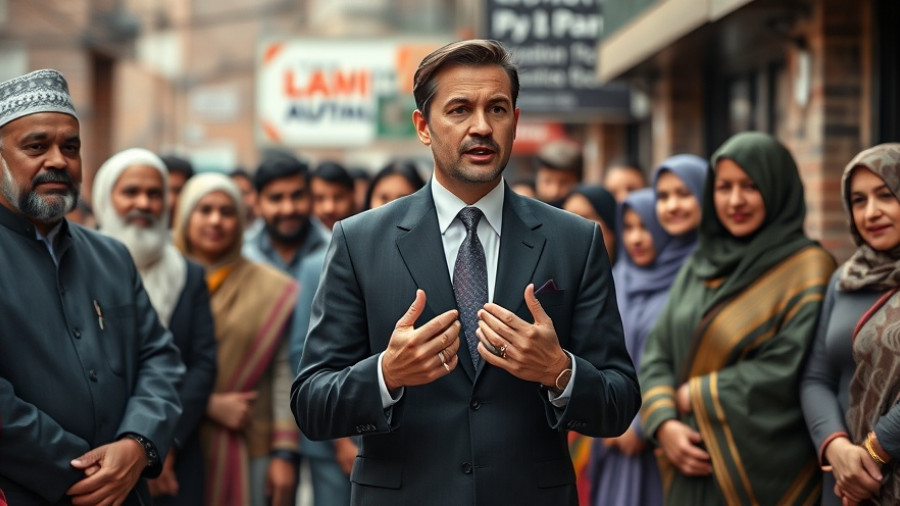
Zohran Mamdani and 9/11: A Controversial Reflection on Trauma
This past week, candidate Zohran Mamdani, who is vying for the New York City mayoral seat, made headlines for remarks linking an family member's experience to the legacies of 9/11. Speaking outside the Islamic Cultural Center of The Bronx, Mamdani claimed that his aunt ceased using the subway after the attacks out of fear that her hijab would mark her as a target for harassment. His comments ignited reactions from various quarters, predominantly highlighting the sensitive intersection of post-9/11 trauma and the current political landscape centered on Islamophobia.
Perceptions of Victimhood in a Post-9/11 America
Mamdani’s assertion raised eyebrows as many critics reacted to what they perceived as an attempt to trivialize the profound tragedy of 9/11. The context in which he made these remarks—during heightened tensions surrounding his candidacy, where anti-Muslim sentiments are resurging—has amplified scrutiny towards both his statements and motivations. Commentators have pointed out the stark contrast between individual experiences of fear and the massive loss of life experienced during the attacks, with social media erupting into a flurry of corrections regarding whose narrative truly holds weight in discussions about 9/11.
One significant voice in the criticism came from Vice President JD Vance, who dismissed Mamdani's comments as overly self-centered, suggesting that focusing on personal discomfort does not equate to the broader suffering endured by victims of the attacks. This sentiment underscores a reaction that many Americans, particularly those who lost loved ones, may share—a sense of indignation towards narratives that divert attention from collective grief.
Islamophobia's Resurgence: The Aftermath of Mamdani's Statements
In the wake of Mamdani’s comments, discussions surrounding Islamophobia in the United States have regained traction. Reference materials from The New York Times spearhead this dialogue, emphasizing the struggles many Muslim Americans face in an environment laden with discrimination. Indeed, right-wing rhetoric has reignited its intensity, and Mamdani’s visibility as a candidate has only put the Muslim community back in the crosshairs of harmful bias.
Critics have noted that anti-Muslim sentiment often resurges cyclically in response to political events or narratives. Following Mamdani's remarks, conservative figures have intensified their discussions around Islam, with accusations and distortions aimed at both him personally and the broader Muslim community. In this context, Mamdani’s experience is not unique but part of a larger pattern where candidates from minority communities are scrutinized and often vilified.
Collective Memory and the Impact of Public Discourse
Mamdani’s comments and their reception illuminate crucial truths about American society’s reckoning with its past. For many, 9/11 represents not merely a historical date but an enduring reminder of loss and vulnerability. For Muslims, these reflections are often intertwined with complex feelings of loyalty and belonging. The suggestion that personal experiences of fear could eclipse collective trauma complicates the narrative, asking us to explore who deserves to speak of suffering and how stories are told. This discussion is especially poignant in light of recent resurging Islamophobic incidents, which underscore the necessity for compassion and understanding in public discourse.
Vision for an Inclusive Future
As Mamdani continues his campaign, it will be essential for him to articulate a vision that transcends personal anecdote and addresses the systemic issues surrounding Islamophobia. According to community leaders, a comprehensive approach that fosters dialogue among different demographics is critical. It may serve to bridge gaps between various communities, uniting them against a shared problem rather than pitting their experiences against one another in a hierarchy of suffering.
Nevertheless, the unfortunate reality persists that Islamophobia can often yield divisive consequences in the political arena. The strength of minority voices in an electoral context may hinge on areas of unity found among diverse groups, and Mamdani’s campaign could serve as a litmus test of this theory.
Call to Action: Share Your Story
Have a story to share or want to contact us for more details? Drop us an email at team@kansascitythrive.com. Your voice matters and is essential to fostering understanding and empathy in our community.
 Add Row
Add Row  Add
Add 




Write A Comment